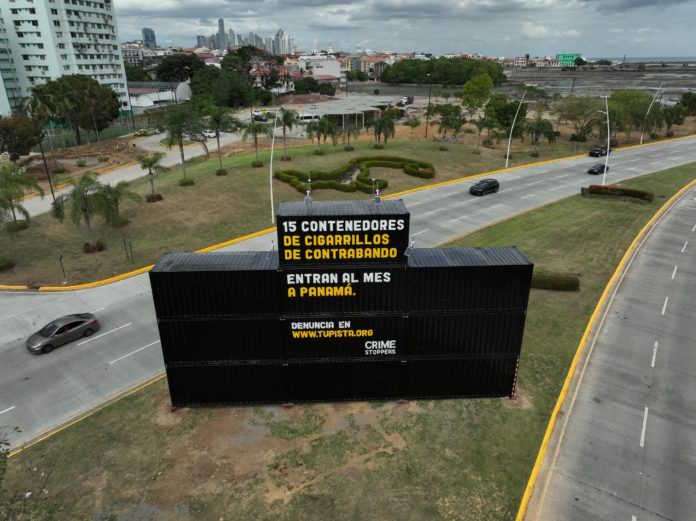Crime Stoppers International (CSI) erect a structure of fifteen 40-foot containers in Panama City
To highlight the impact of the problem of illicit trade Crime Stoppers International (CSI) have erected a structure of fifteen 40-foot containers in Panama City ahead of the tenth Conference of the Parties (COP) of the World Health Organisation’s (WHO) Framework Convention on Tobacco Control (FCTC), currently underway.
Panama and South Africa have many similarities when it comes to illicit trade with the South African Revenue Service (SARS) estimating that illicit trade costs the South African economy R100 billion (USD 5.9 billion) every year.
According to a 2022 study from Nielsen, approximately 1,850 million units of cigarettes are smuggled annually in Panama. That represents more than 15 40-foot containers a month of illegal cigarettes entering Panama. At that level, cigarette smuggling results in an annual tax loss of US$300 million for the Panamanian treasury.
To highlight the impact of this problem, Crime Stoppers unveiled a structure of 15 containers in the Cinta
Costera of Panama City, one of the busiest avenues, and called on the government to urgently address the problem.
Speaking to the media at the unveiling yesterday, Alejo Campos, regional director of Crime Stoppers for Caribbean, Bermuda, and Latin America, said, “Cigarettes are widely used to launder money through ‘trading,’ which is money laundering through trade—and this can be a legal or illegal trade.” Campos explained that “although Panama has reduced the number of people who smoke to around 150,000 (a small number compared to the 4 million inhabitants in the country), what is worrying is that of those 150,000, almost all—92%—are smoking a cigarette that is illegal.”
“To summarise: Of every 10 people who smoke in Panama, nine are smoking a cigarette that is illegal.
That is contraband, with all the negative implications that this has for tax collection, public health, and, above all, our main focus: the issue of national security and defence,” Campos concluded.
Gregoire Verdeaux, Senior Vice President External Affairs for Philip Morris International, joined Campos at the event, where he expressed hope that the issue will be urgently addressed by the authorities.
“Something can be done, and it can be done very practically through two things: determination and political priority to fight this, with the right funding and the right laws. We must have market regulations that is sensible; if you prohibit products, they will end up in the black market. We can learn from examples in Europe where sensible regulations have been introduced to control, regulate, and tax alternatives to cigarettes. So, you don’t corner smokers into the black market, but you offer them the legal way out.”
Pointing to the structure of containers behind him, Verdeaux noted, “I spent the morning at the Free Trade Zone of Colon, and I’ve seen the desire to act and the determination of the police force and customs. They need resources, they need direction, but they are ready. Panama is a wonderful country with wonderful people, and they deserve a better story than what we see behind us.”












